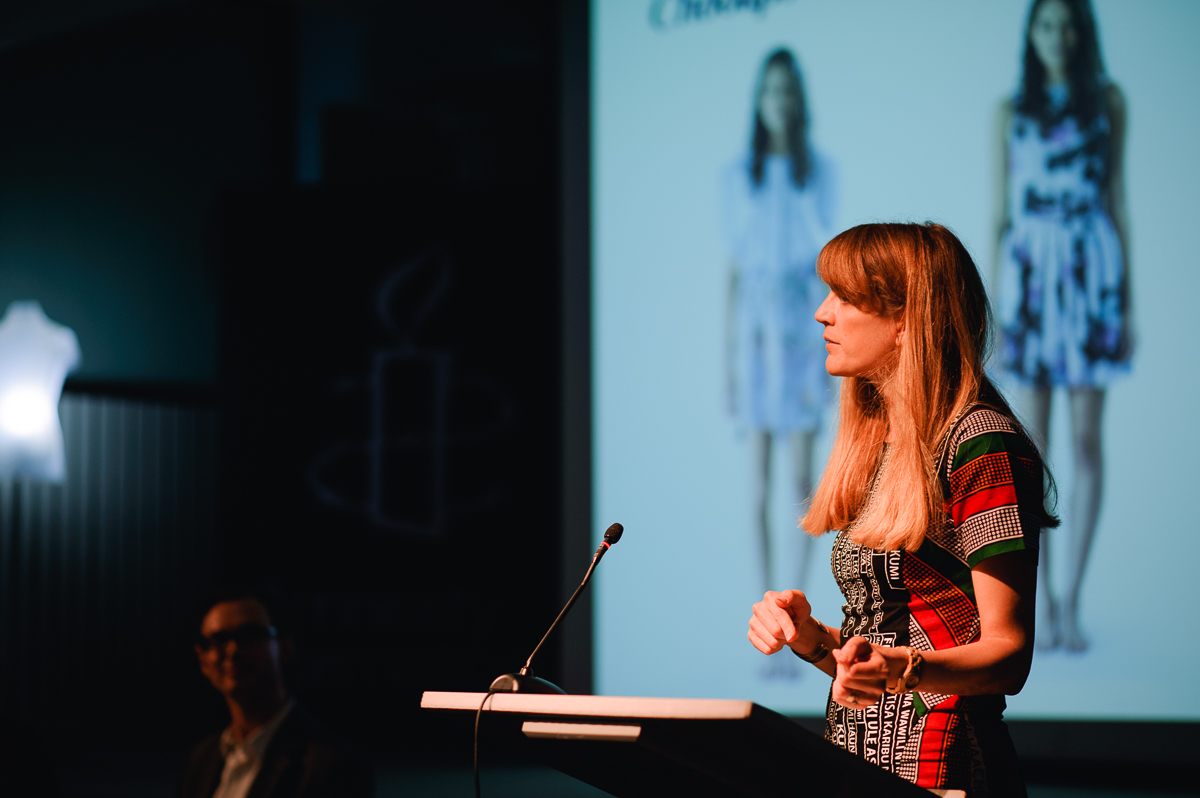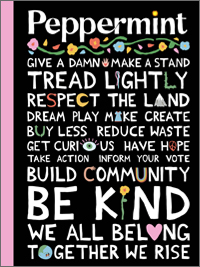
Source Summit London 2014
 ‘Without exception, everyone in this room is doing something inspiring,’ Tamsin Lejeune tells us. This is an opening gambit that we’ve all heard before at one networking event or another. Only this time, the buzz in the room was palpable because when you’re at the ethical fashion forum’s Source Summit, this kind of statement doesn’t feel disingenuous. The make up of the first panel (Jo Confino – Editorial Director of Guardian Sustainable Business, Ed Gillespie – Co Founder of Futerra and Ben Ramsden – Founder of Pants to Poverty and Pi Foundation) only further served to reinforce the idea that getting to know the rest of the people attending this event was going to be exciting!
‘Without exception, everyone in this room is doing something inspiring,’ Tamsin Lejeune tells us. This is an opening gambit that we’ve all heard before at one networking event or another. Only this time, the buzz in the room was palpable because when you’re at the ethical fashion forum’s Source Summit, this kind of statement doesn’t feel disingenuous. The make up of the first panel (Jo Confino – Editorial Director of Guardian Sustainable Business, Ed Gillespie – Co Founder of Futerra and Ben Ramsden – Founder of Pants to Poverty and Pi Foundation) only further served to reinforce the idea that getting to know the rest of the people attending this event was going to be exciting!
 Business leaders, designers and ethical and sustainable fashion start ups gathered to listen, to talk and to learn about everything from the finer details of the production line to Pi 3D – an alternate value system that looks to redefine return on investment to represent social and environmental as well as financial profits. The first speaker of the day was a fountain of sustainability knowledge – Source Intelligence Editor Sarah Ditty. She told us ‘we all have the power to shape the world we live in.’ And over the course of her talk we were reminded that companies tackling waste impacts are noted for producing higher profit margins on average and for having higher investment returns than their less resource-efficient rivals. I’m sure that for many, the idea that companies with strong ethical conviction are more successful was encouraging. It was great to know that 21% of CEOs believe that sustainability effects quarterly performance and that tackling these issues sets you up for future perception of success. There is even compelling evidence to suggest that consumers DO care. Not quite so positively, this was closely followed by the fact that companies freely admit that they are not doing enough to address sustainability concerns.
Business leaders, designers and ethical and sustainable fashion start ups gathered to listen, to talk and to learn about everything from the finer details of the production line to Pi 3D – an alternate value system that looks to redefine return on investment to represent social and environmental as well as financial profits. The first speaker of the day was a fountain of sustainability knowledge – Source Intelligence Editor Sarah Ditty. She told us ‘we all have the power to shape the world we live in.’ And over the course of her talk we were reminded that companies tackling waste impacts are noted for producing higher profit margins on average and for having higher investment returns than their less resource-efficient rivals. I’m sure that for many, the idea that companies with strong ethical conviction are more successful was encouraging. It was great to know that 21% of CEOs believe that sustainability effects quarterly performance and that tackling these issues sets you up for future perception of success. There is even compelling evidence to suggest that consumers DO care. Not quite so positively, this was closely followed by the fact that companies freely admit that they are not doing enough to address sustainability concerns.
 For me, this is the crux of why we all came together at the summit. Because while 64% say they would prefer to purchase sustainably conscious clothing, 34% blame the manufacturer and, even in the wake of Rana Plaza, too many fashion retailers still can’t tell you exactly where their clothes come from. So, blame the manufacturers we might – for not being transparent enough or for not fully understanding their own production line and its impacts – but ultimately it’s not just about process, it’s not just capital greed and it’s not just cultural inertia. It’s all of these things, and the summit brought people together to discuss new initiatives, what’s working, what’s not and what’s next. Ditty didn’t disappoint on providing tangible examples of innovative brands and successes – Auria, Brothers We Stand, Gather and See, as well as many tech innovators. Worth checking out if you’re not already familiar.
For me, this is the crux of why we all came together at the summit. Because while 64% say they would prefer to purchase sustainably conscious clothing, 34% blame the manufacturer and, even in the wake of Rana Plaza, too many fashion retailers still can’t tell you exactly where their clothes come from. So, blame the manufacturers we might – for not being transparent enough or for not fully understanding their own production line and its impacts – but ultimately it’s not just about process, it’s not just capital greed and it’s not just cultural inertia. It’s all of these things, and the summit brought people together to discuss new initiatives, what’s working, what’s not and what’s next. Ditty didn’t disappoint on providing tangible examples of innovative brands and successes – Auria, Brothers We Stand, Gather and See, as well as many tech innovators. Worth checking out if you’re not already familiar.
Founder of Shakah Charkra Sara Simmond’s sassy approach to making sustainable fashion feel sexy was slightly controversial alongside all the feel-good stuff. But there was no doubt that her point about the way sustainable brands are presented to market hit the nail on the head. Her mantra was: yes, be product centric, but follow this up with fantastic branding and marketing – don’t skimp in this area, and be sure to let the product open the door to telling your sustainable story. Her take home message was that the sustainable story should never come before making sure the product feels uber desirable. I’m not sure about her assertion that sustainable doesn’t hold much street cred, but I’m almost certain that, if this is the case, there’s a cultural change movement that every one of us who attended is involved in right now. The need for a holistic approach and a pulling together across all disciplines of thoughts around where change is most needed is key.
The day was also serious value for money. So jam-packed with information, I felt like I’d ordered a main meal and got sides, dessert and coffees – lots of coffees (fair trade obviously)! By the end of the summit I was full of all the good stuff and wired with ideological nuggets as well as belt and braces ‘How To’ information. Workshop speaker Warren Knight (business growth and social media expert) outlined a really pragmatic approach for building a brand’s online presence. Perhaps fairly obviously, but beautifully anecdotally, he demonstrated how imperative storytelling is to all brands, especially those that truly have a noteworthy story to tell. That applies to pretty much every sustainable brand, and if you were a relatively new start up, you probably couldn’t help but feel excited about starting to craft your brand’s story after this workshop.
 All this was topped off by the awe-inspiring Baroness Lola Young (All-Party Parliamentary Group on Ethics and Sustainability in Fashion), whose charismatic chairing of the closing panel stirred up discussion around the psychological need to engage in fast fashion.
All this was topped off by the awe-inspiring Baroness Lola Young (All-Party Parliamentary Group on Ethics and Sustainability in Fashion), whose charismatic chairing of the closing panel stirred up discussion around the psychological need to engage in fast fashion.
 In the end, I’m sure that no one could disagree with Amisha Ghadiali of Provenance when she introduced the day as an opportunity above all to learn and collaborate with like-minded pioneers. This was perfectly illustrated by Joanna Maiden (Founder of SOKO – Socially and Environmentally conscious Kenyan Factory) generously offering up her costing model spreadsheet to a self-confessed struggling audience member. ‘I’ll send it to you over email’ she said, and everyone clapped – one lady admitting that as Jo opened her factory in 2009, hers was having to close its doors. People were genuinely in awe of each other’s achievements within the sustainable fashion industry and excited to leave and apply their learnings to their own work. Well done Ethical Fashion Forum – a brilliant day, finished off with a healthy helping of wine to get everyone swapping their recycled business cards before bedtime.
In the end, I’m sure that no one could disagree with Amisha Ghadiali of Provenance when she introduced the day as an opportunity above all to learn and collaborate with like-minded pioneers. This was perfectly illustrated by Joanna Maiden (Founder of SOKO – Socially and Environmentally conscious Kenyan Factory) generously offering up her costing model spreadsheet to a self-confessed struggling audience member. ‘I’ll send it to you over email’ she said, and everyone clapped – one lady admitting that as Jo opened her factory in 2009, hers was having to close its doors. People were genuinely in awe of each other’s achievements within the sustainable fashion industry and excited to leave and apply their learnings to their own work. Well done Ethical Fashion Forum – a brilliant day, finished off with a healthy helping of wine to get everyone swapping their recycled business cards before bedtime.
 Words Emma Slade Edmondson, images Rachel Manns.
Words Emma Slade Edmondson, images Rachel Manns.


